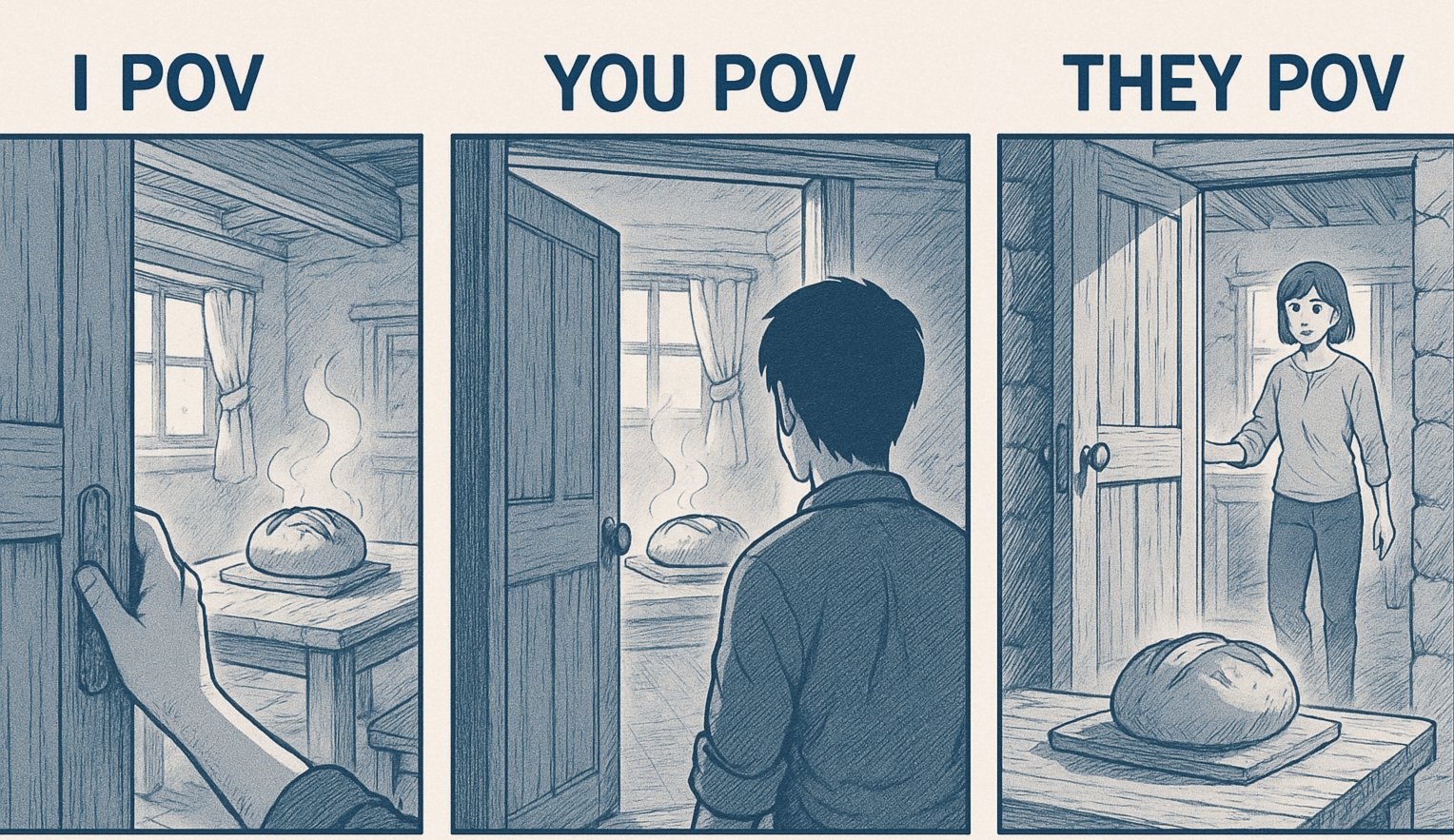- Beyond the Story by Epaphra
- Posts
- The One Word That Changes Everything
The One Word That Changes Everything

Hey Beyonder!
Why perspective matters more than your message
Same story. Same facts. Same lesson.
But told three different ways, it lands completely differently.
The difference? One word.
The narrator.
And that choice controls how your audience feels.
The Problem With How We Tell Stories
Most content tells stories from one angle.
"I learned this. I did that. I figured it out."
It's natural. It's honest. But here's the issue.
The lens you choose puts your audience in a specific position.
And that position changes everything about how they receive your message.
The Three Lenses That Change How Stories Land
Every story has a narrator. And that narrator controls how your audience feels.
There are three lenses you can use:
You POV makes it feel personal and close.
They POV makes it feel cinematic and distant.
We POV makes it feel shared and tribal.
Same story. Different emotional punch.

The Three Lenses
Let me show you how a brand used this to turn bland into brilliant.
How Airbnb Made You The Hero
Airbnb's "Made Possible by Hosts" campaign could've been typical brand messaging.
"We connect millions of travelers. We offer unique stays. We're changing travel."
Boring. Corporate. Nobody cares.
Instead, they flipped the lens completely. They wrote their ads as guest stories, speaking directly to you:
"I stayed in a fisherman's cottage in Portugal. Every morning, he'd leave fresh bread on the doorstep."
Not "Airbnb offers authentic experiences."
Not "Our hosts provide local hospitality."
Just: I stayed. He left bread. I felt something.
You're not watching someone else's vacation. You're there.
That's the power of POV. It pulls you in because it speaks like you think.
Why Perspective Controls Emotion
Here's the same moment told three ways:
I POV: "I walked into the cottage and saw fresh bread waiting."
You watch me. You stay outside.
You POV: "You walk in. Fresh bread's sitting there, still warm."
You're in it. You smell it.
They POV: "She walked into the cottage. Fresh bread waited on the counter."
You observe her. Feels like a movie.
Same scene. Totally different feeling.
I POV builds trust. You're hearing direct experience.
You POV builds immersion. You're living the experience.
They POV builds curiosity. You're watching someone else live it.
None is better. Each does something different.
The mistake? Using the same POV for everything.
When to Use Each Lens
Use "You" when:
You want them inside the moment. Tutorials. Struggles. Choices.
"You've spent hours on a post. You hit publish. Nothing happens."
Instant relatability.
Use "They" when:
You want them watching transformation. Case studies. Success stories. Character arcs.
"She posted every day for 90 days. On day 91, everything changed."
You want to see what happens next.
Use "We" when:
You want to build belonging. Shared struggles. Community truths.
"We've all posted something we thought would blow up. And then... crickets."
Creates a tribe instantly.
Pro tip: Mix them in one piece.
Start with "we" to build connection. Shift to "you" for the lesson. End with "they" to show the outcome.
The Difference in Action
Compare these two ways of opening a story:
Brand Voice (They POV):
"Airbnb connects travelers with unique homes around the world."
Guest Voice (You POV):
"You walk into a cottage. The host left fresh bread on your doorstep."
First one is a fact.
Second one is a feeling.
Airbnb chose feeling. And their campaign got over 17 million views.
Try This This Week
Pick one piece of content you're working on.
Write the opening in all three POVs:
Version 1 (You): "You know that moment when..."
Version 2 (They): "She looked at her screen and..."
Version 3 (We): "We've all been there when..."
Test them. See which one creates the feeling you want.
You'll notice the difference immediately.
The Real Shift
You're not just choosing pronouns.
You're choosing where your audience stand.
Outside looking in? Or inside living it?
That choice controls everything.
Airbnb didn't say "we provide experiences." They said "you wake up to fresh bread."
One keeps you distant. The other puts you there.
So before you write your next piece, ask:
Where do I want them standing?
Keep shifting perspectives,
Epaphra
P.S. The lens is the lever. Move it, and the entire story shifts.